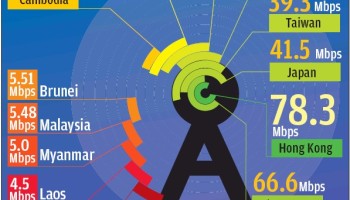“FAKE NEWS” has seemingly, suddenly, become fashionable. In reality, the fake has proliferated for a decade or more, but the faux, the flawed and the fraudulent are now pressing issues because the full scale of the changes wrought upon the integrity of news and advertising by the digital duopoly — Google and Facebook — has become far more obvious.
Google’s commodification of content knowingly, wilfully undermined provenance for profit. That was followed by the Facebook stream, with its journalistic jetsam and fake flotsam. Together, the two most powerful news publishers in human history have created an ecosystem that is dysfunctional and socially destructive.
Both companies could have done far more to highlight that there is a hierarchy of content, but instead they have prospered mightily by peddling a flat-earth philosophy that doesn’t distinguish between the fake and the real because they make copious amounts of money from both.
Depending on which source you believe, they have close to two-thirds of the digital advertising market — and let me be clear that we compete with them for that share. The Interactive Advertising Bureau estimates they accounted for more than 90% of the incremental increase in digital advertising over the past year. The only cost of content for these companies has been lucrative contracts for lobbyists and lawyers, but the social cost of that strategy is far more profound.
It is beyond risible that Google and its subsidiary YouTube, which have earned many billions of dollars from other people’s content, should now be lamenting that they can’t possibly be held responsible for monitoring that content. Monetising yes, monitoring no — but it turns out that free money does come at a price.
We all have to work with these companies, and we are hoping, mostly against hope, that they will finally take meaningful action, not only to allow premium content models that fund premium journalism, but also to purge their sites of the rampant piracy that undermines creativity. Your business model can’t be simultaneously based on both intimate, granular details about users and no clue whatsoever about rather obvious pirate sites.
Another area that urgently needs much attention is the algorithms that Silicon Valley companies, and Amazon, routinely cite as a supposedly objective source of wisdom and insight. These algorithms are obviously set, tuned and repeatedly adjusted to suit their commercial needs. Yet they also blame autonomous, anarchic algorithms and not themselves when neofascist content surfaces or when a search leads to obviously biased results in favour of their own products.
Look at how Google games searches. A study reported in The Wall Street Journal found that in 25,000 random Google searches ads for Google products appeared in the most prominent slot 91% of the time. How is that not the unfair leveraging of search dominance and the abuse of algorithm? All 1,000 searches for “laptops” started with an ad for Google’s Chromebook — 100% of the time. Kim Jong Un would be envious of results like that at election time.
And then there are the recently launched Google snippets, which stylistically highlight search results as if they were written on stone tablets and carried down from the mountain. Their sheer visual physicality gives them apparent moral force. The word Orwellian is flagrantly abused, but when it comes to the all-powerful algorithms of Google, Amazon and Facebook, Orwellian is underused.
As for news, institutional neglect has left us perched on the edge of the slippery slope of censorship. There is no Silicon Valley tradition, as there is at great newspapers, of each day arguing over rights and wrongs, of fretful, thoughtful agonising over social responsibility and freedom of speech.
What we now have is a backlash with which these omnipotent companies are uniquely ill-equipped to cope. Their responses tend to be political and politically correct. Regardless of your own views, you should be concerned that we are entering an era in which these immensely influential publishers will routinely and selectively “unpublish” certain views and news.
We stumble into this egregious era at a moment when the political volume in many countries is turned to 10. The echo chamber has never been larger and the reverb room rarely more cacophonous. This is not an entirely new trend, but it has a compounding effect with the combination of “holier than thou” and “louder than thou.”
Curiously, this outcome is, in part, a result of the idealism of the Silicon Valley set, and there’s no doubt about the self-proclaimed ideals. They devoutly believe they are connecting people and informing them, which is true, even though some of the connections become conspiracies and much of the information is skimmed without concern to intellectual property rights.
Ideas aside, we were supposed to be in a magic age of metrics and data. Yet instead of perfect precision we have the cynical arbitraging of ambiguity — particularly in the world of audiences. Some advertising agencies are also clearly at fault because they, too, have been arbitraging and prospering from digital ambiguity as money in the ad business has shifted from actually making ads to aggregating digital audiences and ad tech, better known as fad tech.
And so, as the Times of London has reported, socially aware, image-conscious advertisers find themselves in extremely disreputable places — hardcore porn sites, neofascist sites, Islamist sites. The embarrassment for these advertisers juxtaposed with jaundice is understandable, but the situation is far more serious than mere loss of face.
If these sites are getting a cut of the commission, the advertisers are technically funding these nefarious activities. Depending on the type of advertising, it is estimated by the ad industry that a YouTube partner could earn about 55% of the revenue from a video. In recent years, how many millions of dollars have been channelled to organisations or individuals that are an existential threat to our societies?
Provenance is profound, and in this age of augmented reality and virtual reality, actual reality will surely make a comeback. Authenticated authenticity is an asset of increasing value in an age of the artificial — understanding the ebb and flow of humanity will not be based on fake news or ersatz empathy, but on real insight.
BY ROBERT THOMSON
Robert Thomson is the chief executive of News Corp, which owns The Australian and The Wall Street Journal. This is adapted from a speech he delivered on March 29 to the Asia Society in Hong Kong.
PETALING JAYA: The proliferation of fake news on social media has benefited publishers like Google and Facebook in terms of digital advertising market share at the expense of other media companies. News Corp chief executive Robert Thomson recently in his speech noted that Google and Facebook, for example, have close to two-thirds of the digital advertising market.
The Interactive Advertising Bureau estimates they accounted for more than 90% of the incremental increase in digital advertising over the past year, he said.
The only cost of content for these companies has been lucrative contracts for lobbyists and lawyers, he added, noting that the social cost of that strategy is far more profound.
Thomson said this during his speech to the Asia Society in Hong Kong on March 29.
News Corp is also the owner of The Australian and The Wall Street Journal. “Google’s commodification of content knowingly, wilfully undermined provenance for profit. That was followed by the Facebook stream, with its journalistic jetsam and fake flotsam.
Together, the two most powerful news publishers in human history have created an ecosystem that is dysfunctional and socially destructive,’’ he said.
Both companies, he said could have done far more to highlight that there is a hierarchy of content, but instead they have prospered mightily by peddling a flat-earth philosophy that doesn’t distinguish between the fake and the real because they make copious amounts of money from both.
“It is beyond risible that Google and its subsidiary YouTube, which have earned many billions of dollars from other people’s content, should now be lamenting that they can’t possibly be held responsible for monitoring that content. Monetising yes, monitoring no – but it turns out that free money does come at a price.
“We all have to work with these companies, and we are hoping, mostly against hope, that they will finally take meaningful action, not only to allow premium content models that fund premium journalism, but also to purge their sites of the rampant piracy that undermines creativity,” Thomson said.
In his speech, he also said although “fake news” has seemingly, suddenly, become fashionable but in reality, the fake has proliferated for a decade or more.
But the faux, the flawed and the fraudulent are now pressing issues because the full scale of the changes wrought upon the integrity of news and advertising by the digital duopoly — Google and Facebook — has become far more obvious, he said.
Thomson also highlighted on the urgency of algorithms. Another area, he said that urgently needs much attention is the algorithms that Silicon Valley companies, and Amazon, routinely cite as a supposedly objective source of wisdom and insight.
“These algorithms are obviously set, tuned and repeatedly adjusted to suit their commercial needs.
“Yet they also blame autonomous, anarchic algorithms and not themselves when neofascist content surfaces or when a search leads to obviously biased results in favour of their own products,’’ he said.
A study reported in The Wall Street Journal found that in 25,000 random Google searches ads for Google products appeared in the most prominent slot 91% of the time.
“How is that not the unfair leveraging of search dominance and the abuse of algorithm?” he asked. All 1,000 searches for “laptops” started with an ad for Google’s Chromebook – 100% of the time.
And then there are the recently launched Google snippets, which stylistically highlight search results as if they were written on stone tablets and carried down from the mountain. Their sheer visual physicality gives them apparent moral force, he said.
“The word Orwellian is flagrantly abused, but when it comes to the all-powerful algorithms of Google, Amazon and Facebook, Orwellian is underused,’’ he said.
Thomson said: “What we now have is a backlash with which these omnipotent companies are uniquely ill-equipped to cope. Their responses tend to be political and politically correct.
Regardless of your own views, you should be concerned that we are entering an era in which these immensely influential publishers will routinely and selectively “unpublish” certain views and news.
He also faulted ad agencies as they have been arbitraging and prospering from digital ambiguity as money in the ad business has shifted from actually making ads to aggregating digital audiences and ad tech, better known as fad tech.
“Provenance is profound, and in this age of augmented reality and virtual reality, actual reality will surely make a comeback. Authenticated authenticity is an asset of increasing value in an age of the artificial – understanding the ebb and flow of humanity will not be based on fake news or ersatz empathy, but on real insight,’’ he added.
Sources: Starbiz
Related posts
‘Essential to tackle fake news correctly’ KUALA LUMPUR: Your office is swamped by phone calls from impatient customers, asking w...
















 Ransomware blackmails Internet users by encrypting the files on their computer or mobile device and demanding payment, generally in the virtual currency bitcoin, to unlock them. — dpa
Ransomware blackmails Internet users by encrypting the files on their computer or mobile device and demanding payment, generally in the virtual currency bitcoin, to unlock them. — dpa











